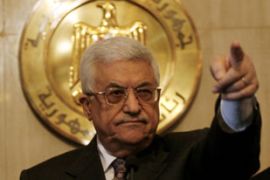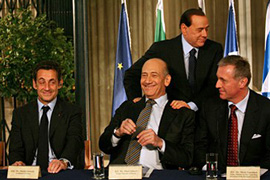Egypt summit backs peace efforts
Gaza’s humanitarian needs in focus as European and Middle East leaders hold talks.

No unanimous position statement came out of the summit, but all the leaders emphasised the need to deal with Gaza’s immediate humanitarian and reconstructions needs.
They also stressed the need to work towards a more permanent resolution to the conflict.
Meeting with Olmert
After the summit, the European leaders who participated travelled to Israel where they met Ehud Olmert, the Israeli prime minister.
Olmert told them he wanted to pull Israel’s forces out of the Gaza Strip as soon as possible following.
| IN DEPTH |
 Analysis and features from Gaza and Israel |
 Track the war and submit your own reports |
 Send us your views and eyewitness videos |
“We are interested in quitting the Gaza Strip at the greatest possible speed. We don’t want to stay in Gaza and we intend to leave it as quickly as possible,” he said.
Before heading to Israel, Nicolas Sarkozy, France’s president, said: “We will now head to Israel, in order to convey a message. We support Israel in order to achieve its rights and security.
“However, Israel should state immediately and clearly that if rocket fire stops, the Israeli army will leave Gaza. There is no other solution to achieve peace.”
Earlier, at the Sharm el-Sheikh meeting, Mahmoud Abbas, the Palestinian president who is based in the West Bank, expressed hope that the ceasefire will be lasting and that the Palestinians will now be given access to humanitarian support and assistance.
“We also call for a reconstruction conference and a national conference to discuss reconciliation, but all these issues can be discussed later on,” he said.
“The utmost urgency was to stop the war and the hostilities. That has happened and we hope it will be lasting.”
The summit was also attended by the presidents of France, Turkey and Jordan, secretaries-general of the United Nations and the Arab League, prime ministers of the UK, Italy, Spain, Czech Republic and Germany’s chancellor.
Hamas, which forms the de facto government in Gaza, had not been invited.
Irrelevant leaders
Mouin Rabbani, a contributing editor to the Middle East Report magazine, dismissed the significance of the Sharm el-Sheikh summit.
Speaking to Al Jazeera, he said: “What we are seeing now is a sideshow by people who through their own misjudgments, miscalculations, and ill-advised alliances, have sidelined and marginalised themselves, and made themselves irrelevant to the objectives they are seeking to achieve.”
 |
| The European leaders travelled to Israel late on Sunday hold talks with Olmert [AFP] |
Rabbani also said the leaders talked about the humanitarian crisis in Gaza as if it had been caused by an earthquake.
“I’m speechless, that you can, in 2009, have a major international gathering to discuss the Israeli-Palestinian conflict, and have a whole series of keynote addresses, in which the word occupation isn’t mentioned even once.”
Al Jazeera’s Amr El Kahky, reporting from the summit, said that even though no unified statement was agreed, there were positive bits and pieces for all parties.
“For Israel, the security guarantees, to stop the smuggling of arms, that Hamas will not rearm again. At the same time, they spoke for the first time about ending the blockade, of reopening the crossing points and getting the peace process back on track.”
Ceasefire ‘insufficient’
Mubarak met Abbas in Cairo on Sunday before the Sharm el-Sheikh summit to discuss how to open Gaza’s border crossings and mobilise humanitarian aid in the territory.
Abbas said “the ceasefire is important and necessary but insufficient”.
“There must be a complete Israeli withdrawal from Gaza and a reopening of crossing points to allow the arrival of aid to the Palestinian people of Gaza,” he said, as quoted by MENA, the official Egyptian news agency.
Mubarak is expected to travel to Kuwait on Monday for an Arab economic summit, which has shifted its focus to the crisis in Gaza.
Arab leaders have faced sharp criticism for an apparent lack of action over Israel’s offensive in Gaza, and even organising a meeting has highlighted deep divisions.
An emergency summit held in Doha earlier in the week saw Qatar and Mauritania severing ties with Israel, while Egypt and Saudi Arabia refused to attend.